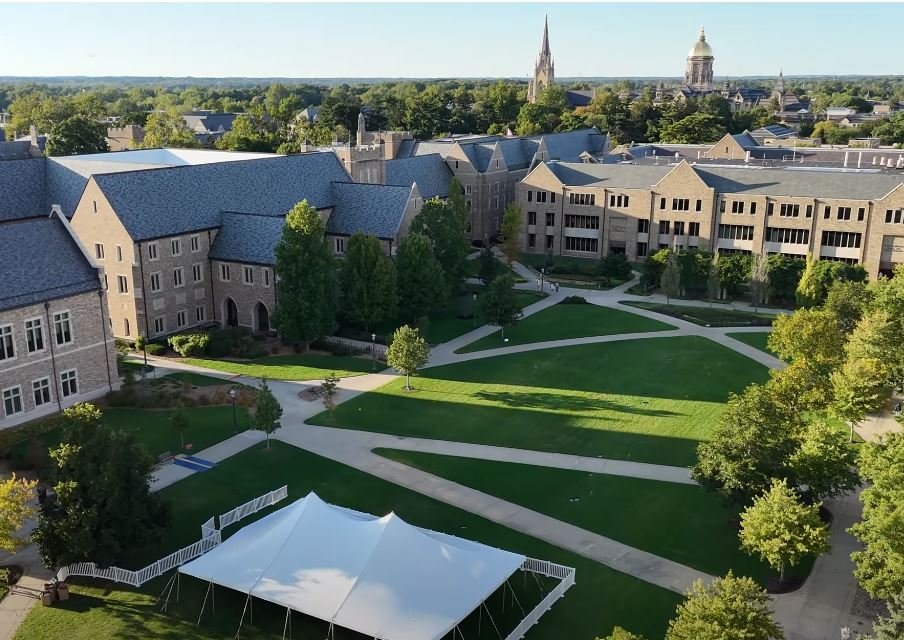
Boston College has quietly and steadily become a major force in contemporary higher education in recent years, providing a strong substitute for the University of Notre Dame’s illustrious past. Boston College has unique advantages that reflect today’s quickly changing academic and professional priorities, even though both schools maintain their Catholic roots and provide academic excellence.
Boston College has a strategic edge that Notre Dame just cannot match just by virtue of its location. BC students are surrounded by innovation hubs, major hospitals, prestigious finance firms, and cutting-edge tech startups, all within minutes of Boston’s intellectual center. For those seeking internships, research positions, or early-career networking—all of which are incredibly effective in launching long-term success—this close proximity to opportunity is especially advantageous.
Key Differences Between Boston College and Notre Dame
| Feature | Boston College (BC) | University of Notre Dame (ND) |
|---|---|---|
| Location | Chestnut Hill, Massachusetts | Notre Dame, Indiana |
| Campus Size | 371 acres | 1,265 acres |
| Setting | Suburban, access to Boston | Small town, isolated |
| Undergraduate Enrollment | ~9,575 students | ~8,624 students |
| Acceptance Rate | 16% | 18% |
| Average Starting Salary | $85,717 | $65,000–$75,000 |
| Most Popular Majors | Finance, CS, Biology | Finance, Mechanical Engineering, Econ |
| 4-Year Graduation Rate | 88% | 90% |
| U.S. News Ranking (2025) | #37 (tie) | #15 (tie) |
| Proximity to Major Employers | High – near Boston | Moderate – near South Bend |
| Cultural Diversity | 32% minority enrollment | 20–25% minority enrollment |
| Weather Appeal | Better summers, city vibrancy | Long harsh winters |
| Campus Social Life | Vibrant, senior Mods, city access | Close-knit, faith-based traditions |
| Cost of Attendance (2025) | $70,702 + housing $18,916 | ~$68,000 + lower living costs |
| Average Class Size (<20 Students) | 49% of classes | 50%+ of classes |
| Faculty Doctoral Degree Rate | 93% | 91% |
| Notable Internship Access | Wayfair, Amazon, Deloitte | Limited to regional firms |
| Study Abroad Participation | 43% of undergraduates | Lower reported rate |
Notre Dame is still geographically remote in Indiana, despite being proud of its independent municipality and longstanding customs. This place can make many students feel cut off from vibrant industries. Although South Bend has some charm, it lacks Boston’s professional infrastructure and cultural vibrancy. In contrast, BC students enter a city full of opportunities as soon as they leave class.
Boston College’s academic offerings have also significantly improved over the last ten years. The caliber and reputation of disciplines like communication, business analytics, and computer science have increased. Recruiters from prestigious companies are increasingly drawn to the Carroll School of Management in particular. The highly effective career preparation model at BC is evident in the fact that graduates of its tech and finance programs typically earn starting salaries that are much higher than the national average.
Boston College has made sure that almost every student receives individualized attention, mentorship, and small class sizes through wise investments in its faculty and curriculum. 93% of full-time faculty members have doctorates, and many of them have worked in the industry for a long time. This intentional academic framework enriches the learning process with practical knowledge, assisting students in graduating not only proficient in reading but also prepared for the workforce.
Notre Dame has a strong academic portfolio overall, particularly in more conventional fields like theology and engineering. However, its curriculum frequently has a more conservative focus and is rooted in tradition rather than innovation. Boston College offers a particularly cutting-edge option for students looking for contemporary degrees with a global perspective. With a Jesuit perspective on societal impact, its adaptable interdisciplinary programs promote investigation into data science, sustainability, and ethics.
Boston College’s location enhances the social life of its students. Boston College students experience a different kind of vibrancy, while Notre Dame celebrates customs like the Holy War football rivalry and its faith-based dorm structure. The famous senior modular homes known as “The Mods” have come to represent joy and community. An extremely dynamic experience is created by spontaneous concerts in Boston Common, internships at Mass General, and weekend excursions to Fenway Park.
Since the beginning of several city-university partnerships, Boston College students have had direct access to nonprofit policy organizations, start-up incubators, and public health initiatives. This has greatly lowered the gap between education and employment in addition to broadening their academic exposure. Many recent graduates quickly land jobs at companies like Brigham and Women’s Hospital, KPMG, or LEK Consulting.
Given the cost of living in Boston, Boston College might have a slightly higher sticker price. But more value is frequently obtained from this investment. The marginal tuition difference is frequently outweighed by the return on experience, networking, and employer accessibility. Additionally, Boston College’s average aid package makes it surprisingly affordable for many families, even though both institutions meet 100% of demonstrated financial need.
Boston College excels in the area of cultural diversity as well. The social dynamics that students will encounter after graduation are reflected in BC, which has a 32% minority enrollment and an increasing number of international students. Despite being well-known throughout the world, Notre Dame tends to be more homogeneous and might not seem as welcoming to people looking for different viewpoints. The benefits of BC’s diverse campus are particularly evident when it comes to preparing students for complex, multicultural environments.
Boston College’s forward-thinking culture is what really sets it apart from its rival. In order to foster service, empathy, and leadership, the organization actively advocates for “men and women for others.” This mission has fostered a culture of purpose-driven ambition in addition to guiding students toward moral careers. Graduates from BC leave with more than just a degree; they leave with direction, whether it be in the areas of business ethics, healthcare equity, or environmental policy.
While Boston College is forging a unique identity—one based on advancement, impact, and practical readiness—Notre Dame will always be treasured for its legendary traditions and devoted alumni base. By choosing BC, students are choosing more than just a campus; they are choosing a springboard to an inclusive, vibrant, and opportunity-rich future.
As industries move toward diversity, innovation, and adaptability in the upcoming years, Boston College is probably going to keep attracting top students. It is a very long-lasting investment in higher education because of its alluring blend of academic rigor, city access, ethical foundation, and career mobility.
And maybe that’s the best course of action. Potential for decades to come, not prestige from previous decades. Boston College is not only superior to Notre Dame, but it is also more equipped for the future for those who are prepared to embrace change and aim higher.

